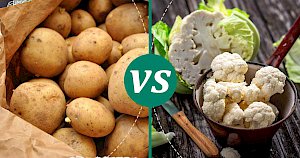Cauliflower vs Potato: Calories & Nutrition Showdown


Cauliflower vs Potato
Nutrition Facts
Serving size:
change
5g10g15g20g30g40g50g60g80g100g120g140g160g180g200g220g250g300g350g400g450g500g600g700g800g900g1000g
1oz2oz3oz4oz5oz6oz7oz8oz10oz12oz15oz20oz25oz30oz35oz40oz50oz
Amount Per Serving:
Serving size:
change
5g10g15g20g30g40g50g60g80g100g120g140g160g180g200g220g250g300g350g400g450g500g600g700g800g900g1000g
1oz2oz3oz4oz5oz6oz7oz8oz10oz12oz15oz20oz25oz30oz35oz40oz50oz
Amount Per Serving:
Cauliflower vs Potato 100g Compare
| per 100g | Cauliflower | Potato |
|---|---|---|
| Calories | 25 | 77 |
| Carbohydrates | 4.97 g | 17.49 g |
| Fat | 0.28 g | 0.09 g |
| Dietary fiber | 2 g | 2.1 g |
| Protein | 1.92 g | 2.05 g |
| Calcium | 22 mg | 12 mg |
| Iron | 0.42 mg | 0.81 mg |
| Magnessium | 15 mg | 23 mg |
| Potassium | 299 mg | 425 mg |
| Sodium | 30 mg | 6 mg |
| Vitaminium B1 (Thiamine) | 0.05 mg | 0.081 mg |
| Vitaminium B2 (riboflavin) | 0.06 mg | 0.032 mg |
| Vitaminium B3 (Niacin) | 0.507 mg | 1.061 mg |
| Vitaminium B5 | 0.667 mg | 0.279 mg |
| Vitaminium B6 | 0.184 mg | 0.298 mg |
| Vitaminium B9 (Folic acid) | 57 mg | 0.015 mg |
| Vitaminium C | 48.2 mg | 19.7 mg |
| Vitaminium E | 0.08 mg | 0.01 mg |
| Vitaminium K | 15.5 µg | 0.002 µg |
Discovering the Nutritional Gems: Cauliflower and Potato
When it comes to choosing vegetables for a balanced diet, the humble cauliflower and the versatile potato often make it to the top of the grocery list. Both are beloved staples in kitchens around the globe, celebrated not only for their culinary flexibility but also for their nutritional profiles. While they may occupy similar spaces in the vegetable aisle, their nutritional contributions to our diet are distinct. Let's dive into a comparative analysis to understand how these two fare against each other in terms of calories, macronutrients, and vitamins.
Calories and Macronutrients: A Closer Look
At the core of any diet, understanding the calorie and macronutrient content of foods is essential. Here, cauliflower and potato present a stark contrast. With just 25 calories per 100 grams, cauliflower stands out as a low-calorie option, compared to potatoes, which pack 77 calories for the same weight. This makes cauliflower an excellent choice for those managing their calorie intake.
Carbohydrates are the primary energy source for the body, and here again, the two vegetables differ significantly. Cauliflower contains about 4.97 grams of carbs, while potatoes surge ahead with 17.49 grams. For individuals on a low-carb diet, cauliflower might be the preferred choice.
Both vegetables offer similar amounts of fiber, around 2 grams, contributing to digestive health and satiety. When it comes to fats, both are low in total fat, but potatoes have a slightly lower fat content at 0.1 grams, compared to cauliflower's 0.28 grams.
Vitamins and Minerals: The Nutrient Powerhouses
Vegetables are not just about calories and macronutrients; they are also a vital source of vitamins and minerals. Cauliflower is rich in Vitamin C, offering 48.2 mg, which is more than double the amount found in potatoes (19.7 mg). This makes cauliflower an excellent choice for supporting the immune system.
When it comes to Vitamin B6, potatoes take the lead with 0.298 mg, aiding in brain health and metabolism, compared to cauliflower's 0.184 mg. However, cauliflower boasts a higher content of Vitamin K, essential for blood clotting and bone health, with 15.5 µg compared to potato's 2 µg.
Minerals are another crucial aspect, with both vegetables offering a good supply of potassium, magnesium, and iron. Potatoes have a higher potassium content (425 mg), which is vital for heart and muscle function, while cauliflower provides a respectable 299 mg. However, cauliflower shines with its calcium content (22 mg), important for bone health, outdoing potatoes (12 mg).
Choosing Between Cauliflower and Potato
Ultimately, the choice between cauliflower and potato depends on individual dietary needs and preferences. For those looking to reduce calorie and carb intake, cauliflower emerges as the clear winner. Its high Vitamin C and K content also make it a nutritious addition to any meal. On the other hand, potatoes offer a richer source of Vitamin B6 and potassium, making them a great choice for energy and muscle function.
Both vegetables are versatile and can be prepared in numerous healthy ways - from roasted and mashed to being incorporated into soups and stews. Incorporating a variety of vegetables into your diet is key to obtaining a broad spectrum of nutrients, so why not enjoy both cauliflower and potatoes in moderation?
Whether you lean towards the low-calorie cauliflower or the carb-rich potato, both vegetables have their unique nutritional profiles that can contribute to a balanced and healthy diet. The choice is yours to make, based on your nutritional needs and taste preferences. Happy eating!
Cauliflower 100g
25kcalCalories source
- 66% CARBS.
- 26% PROTEIN
- 8% FAT
Potato 100g
77kcalCalories source
- 89% CARBS
- 10% PROTEIN
- 1% FAT
Compares of cauliflower
- Cauliflower vs Artichoke
- Cauliflower vs Arugula
- Cauliflower vs Asparagus
- Cauliflower vs Beetroot
- Cauliflower vs Bitter Melon
- Cauliflower vs Bok Choy
- see all compares of cauliflower
Marcin Piotrowicz
calories-info.com creator
Healthy diet and healthy lifestyle promoter
Add comment